1 Half a Day新版现代大学英语精读详细教案
现代大学英语精读1lessonone教案
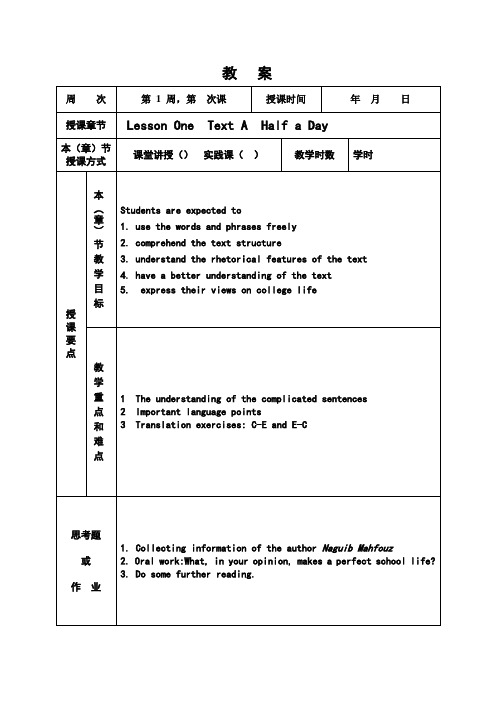
III .Presentation (45minutes)
Appreciationfor group discussion in class
a. Plot of the story:
Naguib Mahfouz was born on the 11th Dec. 1911 in an old quarter ofCairo, the youngest son of a merchant. He studied philosophy at King Faud I (nowCairo) University, graduating in 1934. He worked in university administration and then in 1939 he worked for the Ministry of Islamic Affairs. He was later Head of the State Cinema Organization at the Ministry of Culture. He also worked as a journalist.
Life is a dream. Do not take anything seriously.
Step 2. Read the following suggestions made by the father. Which ones do you agree with and which ones not? Have you ever been given some suggestions by your parents when entering the university? List them out.
最新现代大学英语第一册Lesson 1 Half A Day课件教学提纲
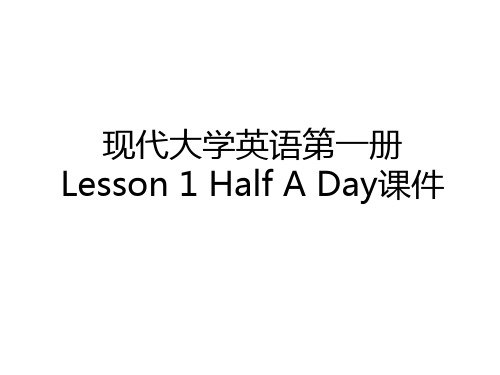
Objectives of First-year Intensive Reading
✓ To introduce students to some new language phenomena
✓ To help students become aware of socio-cultural issues in the learning of language
Protagonist/Narrator: “I” –the boy in the story
Theme of the story: what do you think?
此课件下载可自行编辑修改,仅供参考! 感谢您的支持,我们努力做得更好! 谢谢!
✓ To help students appreciate language from the stylistic perspective
Objectives for First-year Intensive Reading
At a micro level
✓ To help enlarge students’ vocabulary
Warm Up
First day of school …
Warm-up
❖ Was it hard for you to leave home for the first time in your life? Who saw you off at the railway station? Who came to school with you? What did he/she day to you?
❖ Do you find life at college rich and colorful or tedious and boring? Do you have trouble adjusting to life here?
1 Half a Day新版现代大学英语精读详细教案

1 Half a Day新版现代大学英语精读详细教案二、主要内容:第教学周/第节(第次课) 第页Teaching Objectives:1) to have the class handle the usage of simple past and past perfect. 教学目的 2) to have the class learn the key words and expressions3) to have the class discuss their first college day.Teaching Focus1) The first college day.2) The way of telling story 教学重点和难点Possible DifficultiesComprehension of the text.Teaching techniques教学方法和手段 To integrate several different teaching methods and techniques:elicitation; explanation; illustration; recitation and discussion.教学基本内容备注Unit 1 Half a Day1 Culture tipsSchools Stages of education AimsPlay School Preschool education Children mostly play, with Nursery School For 2—5 year-old some early learning.Infant School Primary education for Children learn some basic Junior School 5/6—12/13 skills in reading, writing,arithmetic, art, etc.Comprehensive Secondary education for Students study a wide range School or 12/13—16/18 of subjects in arts, sciencesGrammar and technical areas.SchoolCollege or Further/Higher education for 18+ Students study for University degrees/diplomas inspecialized academic areas.2 StructureThe text can be conveniently divided into three parts.In the first part (para.1-7), we learn about the boy’s misgivings about school. He found it hard to be away from home and mom, and thought schoolwas punishment.1The second part (para.8-16) describes how the boy felt about school. He found that life at school was rich and colorful in many ways, although it alsorequired discipline and hard work.In the last part of the text (17-20), the boy walked out of the school to find that the outside world had changed beyond measure andthat he had grown intoan old man.General AnalysisP lot: a little boy’s first time to go to schoolSetting: on the way to schoolat schoolon the way homeProtagonists: ―I‖ –the boy in the storyTheme of the storyThe following are a few possible understandings of the message the story conveys. Which one do you agree with? Argue with your group partners.Time and tide wait for no man.Life is a tragedy. There is nothing permanent in life but change.Education can never keep up with changes in society.Life is short and time is precious.Life is a dream. Do not take anything seriously.Time goes by quickly and many things can take place in your lifetime. Before you know it, a new society is born.Symbolism is used in the story to play up the theme: Life is like a day of achild, bitter, rich, colorful and short, which is a process of growing up, exploring and acquiring.3 Vocabulary1 alongside prep. Beside, next to 在……旁边,沿着……;和……相比Beside/Alongside his, my trouble is nothing. 和他的相比,我的苦恼算不了什么。
现代大学英语1 unit 1 half a day 自编课程资料

Comprehensive Reading ---- Q & A
Scan Part. 2 and focus on the following questions. Reading skill: transitional words and expressions
Para. 13 Well, it seemed that…..no basis. Para. 15 however Para. 16 In addition Reading skill /// Writing skill
Be a man.
Today you truly begin life.
21
Comprehensive Reading ---- Q & A Scan Part. 2 and focus on the following questions. 1. What are the different understandings of the boy
2021/6/13
Example in the text
Comprehensive Reading ---- The author
u 山中方一(七)日, 世上已千年。
2021/6/13
u 《志林》《水经注》
u “信安山(烂柯山)有石室, 王质入其室,见二童子对弈, 看之。局未终,视其所执伐薪 柯已烂朽,遂归,乡里已非矣 。”
2021/6/13
Comprehensive Reading ---- The author His works
The Cairo Trilogy: a tale of the lives of a Muslim family and spans(跨过) the first half of the 20th century. Each book in the trilogy was named after a suburb of Cairo.
现代大学英语精读1第二版课程设计

现代大学英语精读1第二版课程设计课程概述现代大学英语精读1第二版是一门针对大学英语专业学生的入门课程,旨在帮助学生建立扎实的英语语法和词汇基础,培养阅读、听力、口语和写作等多方面的语言能力。
本课程每周共计4学时,其中2学时为授课时间,2学时为课外阅读和作业时间。
通过本课程的学习,学生将能够更好地理解英语世界的文化、社会和历史。
学习目标1.掌握英语语法和词汇的基本知识。
2.培养阅读和听力能力,加深对英语语言的理解。
3.提高口语和写作能力,培养表达自己的能力。
4.了解英语世界的文化、社会和历史。
教学内容第一周:英语基础知识概述•英语语法和词汇基础知识回顾•英语发音和声调训练第二周:英语阅读技巧•阅读策略的选择和运用•阅读理解的基础练习第三周:英语听力技能•听力训练的基础知识•英语听力材料的选择和使用第四周:英语写作基础•英语写作基础知识•作文范文分析和写作练习第五周:英语口语训练•英语口语技能要点•口语练习和实践第六周:英语世界文化概述•英语世界文化概述•了解英语社会和历史教学方法1.课堂授课:老师将针对每周的学习内容,进行详细的讲解和解析。
2.课外阅读:每周布置适量的阅读任务,学生需要在课外完成相关的阅读和笔记。
3.课余作业:每周布置作业,包括听力、口语和写作等多种形式,以巩固学生的学习成果。
4.小组讨论:学生将被分为若干个小组,每周进行小组讨论和分享,以促进学生之间的交流和合作。
评价方式1.平时表现:包括出勤情况、作业完成情况、小组讨论表现等。
2.期末考试:将考察学生对本课程所学知识和技能的掌握和应用能力。
参考资料•《现代大学英语精读1》第二版教材•《现代大学英语精读1》第二版教师辅导用书•《英语语法与修辞》•《英语写作指南》•英语学习软件和英语听力材料。
《现代大学英语精读1》第1课Half-a-Day-课文讲解

Half a DayNaguibMahfousAbout the AuthorName: NaguibMahfous纳吉布·马哈福兹Nationality:EgyptianDates: From Dec.1911 to Aug. 2006 Birthplace:an old quarter of CairoEducation: studied philosophyat auniversity ofCairo, graduating in 1934.Job: in university administrationas a civil servantas a journalist(记者)Influence: 1st Arab to win the Nobel Prize for literature in 1988described as "a Dickens of the Cairo cafés" and "the Balzac of Egypt".Half of his novels have been made into filmsAbout the AuthorWorks: no fewer than 30 novels, more than 100 short stories, and more than 200 articles●the Cairo Trilogy in 1957●Children of Gebelawi in 1959 (Prize novel for the reasonthat "who, through works rich in nuance - nowclear-sightedly realistic, now evocatively ambiguous -has formed an Arabian narrative art that applies to allmankind"(他通过大量刻画入微的作品—洞察一切的现实主义,唤起人们树立雄心—形成了全人类所欣赏的阿拉伯语言艺术)●the Thief and the Dogs in 1961《小偷与狗》●Small Talk on the Nile in 1966《尼罗河上的絮语》About the Half a Day●First published in Arabic in 1989as part of a short story collectionentitled The False Dawn.●Included in an English-language collection entitled The Time andthe Place in 1991.●Belongs to his later phase and characterized by a shift from socialrealism to a more modern, experimental mode of writing.●An allegorical taleimplicates a commentary on the humancondition; an entire life span is experienced as only ''half a day'' in the school of life and also alludes to the cycle of life, whereby the narrator passes through childhood, middle age and old age in the course of one day.●Uses a strategy commonly used in fiction writing –theprotagonist returns after being absent for a short time to find everything changed beyond recognition. The best example is Rip Van Winkle, a short story by American writer, Washington Irving.●This technique is often used to emphasize rapid changes insociety.Structure●Plot故事情节: a little boy’s first time to go to school●Setting背景: on the way to schoolat schoolon the way home●Protagonist/Narrator主人公/讲述人: “I”–the boy in thestory●Theme of the story主题: rapid changes in societyThree Parts●Para. 1-7: t he boy’s reluctance to go to schoolHis misgivings about school●Para. 8-16: t he Boy’s life at school:Rich and colorful, Requiringdiscipline and hard workPara. 17-20: at the end of school day:Everything has changed!●Detailed Analysis—para1S1---I walked alongside my father, clutching his right hand.1. What’s the function of the –ing form clutchinghis right hand?2. Who clutched his right hand?3. Can you find some other –ing form in this passage whose function is the same as clutching his right hand?S2---All my clothes were new:the black shoes, the green school uniform, and the red cap.S3---They did not make me happy, however, as this was the day I was to be thrown into school for the first time.1. What does They refer to?2. What is the function of the clause I was to bethrown into school for the first time?3. Can you identify the sentence type?Simple sentence, Compound sentenceComplex sentence orCompound-complex sentence4. What’s the p art of speech of however?the minute/moment (that)... as soon as... 一...就...: I want to see him the minute (that) he arrives. 他一来到我就要见他.Detailed Analysis—para2S1---My mother stood at the window watching our progress, and I turned towards her from time to time, hoping she would help.1. Can you identify the sentence type?2. Can you find the logical subject of the present participle phrases watching our progress and hoping she would help?3. What do you get from the phrase hoping she would help?4. What does watching our progress mean?Detailed Analysis—para2S2---We walked along a street lined with gardens and fields planted with crops, pears, and date palms.1. What’s the function of lined with gardens and planted with crops?2. Can you put in the omitted parts of lined with gardens and planted with crops?3. Can you find some more in this passage?Descriptive PhrasesCompare:1.People who are unhappy with the amount of spam they receiveshould write to their lawmakers.2.People unhappy with the amount of spam they receive should writeto their lawmakers.3.Pierre Omidyar, who is the founder of eBay, is one of the richest menin the world.4.Pierre Omidyar, the founder of eBay, is one of the richest men in theworld.5.One-half of all of the e-mail that is sent today is spam.6.One-half of all of the e-mail sent today is spam.7.There are about 11 million items that are listed on eBay.8.There are about 11 million items listed on eBay.9.A man who is living in Florida retired at the age of 37 after makingmillions in the spam business.10.A man living in Florida retired at the age of 37 after making millions inthe spam business.Detailed Analysis—para2S2---We walked along a street lined with gardens, and fields planted with crops: pears, and date palms.Descriptive PhrasesCompare:11.Shoppers who are using eBay can locate a hard-to-find item.12.Shoppers using eBay can locate a hard-to-find item.13.Spam, which is unwanted commercial e-mail, is an annoyingproblem.14.Spam, unwanted commercial e-mail, is an annoying problem.15.eBay, which is an auction Web site, is very popular.16.eBay, an auction Web site, is very popular.17.A man who is in Florida retired at the age of 37.18.A man in Florida retired at the age of 37.19.Pierre, who is from France, created eBay.20.Pierre, from France, created eBay.Detailed Analysis—para2S2---We walked along a street lined with gardens, and fields planted with crops: pears, and date palms.3. From above, can you summarize the similarities of all these sentences?Descriptive PhrasesLanguage Note:1. A descriptive phrase can be essential or nonessential. A nonessentialphrase is set off by commas.People unhappy with the amount of spam they receive should writeto their lawmakers.Pierre Omidyar, the founder of eBay, is one of the richest men in theworld.2.An appositive is always nonessential., an online store, is a very popular Web site.Detailed Analysis—para3S1---"Why school?" I asked my father. "What have I done?”1. What’s the feeling of the boy?2. What’s the elliptical sentence?3. What is the rhetorical question?Summary—para1-3What do you get from these paragraphs?The boy’s feelingHelpless—new clothes did not make me happy Thrown into schoolFrom time to timeHoping she would helpWhy school? What have I done?Detailed Analysis—para4S3---It's a place that makes useful men out of boys.1. make…(out) of sb/sth: cause sb/sth to be orbecome sth使某人[某事物]处於某状况或变成某事物:使其成为争论之点.Eg.W e'll make a footballer of him yet.我们还是要把他造就成优秀的足球运动员Don't make a habit of it/Don't make it a habit.不要养成那样的习惯.2. What is the function of that makes useful menout of boys? Can you find some more in this passage?3. Can you identify the sentence type?Detailed Analysis—para5S2---I did not believe there was really any good to be had in tearing me away from my home and throwing me into the huge, high-walled building.1. It is no good/use doing sth. Or There is no good to be had in doing sth.: It is not useful to do 做…没有什么用处eg. It’s no good crying over spilt milk. 覆水难收It’s no use talking to him2. tearoneself/sb. away from ...:leave sb/sthreluctantly 勉强使离开,忍痛舍去Eg.Do tear yourself away from the television and come out for a walk. 你别舍不得离开电视了, 出去散散步吧.The young artist couldn't tear himself awayfrom da Vinci's Mona Lisa.He couldn’t tear himself away from the book.3. Can you identify the sentence type?Detailed Analysis—para6S1---When we arrived at the gate we could see the courtyard, vast and full of boys and girls.1. What’s the function of the adjective phrase vastand full of boys and girls?2. Can you put in the omitted parts of this phrase?3. Can you identify the sentence type?Detailed Analysis—para7S1---I hesitated and clung to his hand, but he gently pushed me from him.1. Can you identify the sentence type?2. What’s the base/original form of clung?Fling: 扔, 抛, 掷Sting: 蜇(伤), 刺(伤)(某人)String: 装弦, 用线或细绳将…穿起来Swing: 摆动, 摇摆S2---“Be a man,” he said.1. What does man mean here?S3---Y ou will find me waiting for you when it's time to leave. "1. What’s the function of waiting for you?2. Can you tell the difference between object complement andpresent participle as adverbial?Can you tell the difference between object complement and direct object?3. Can you identify the sentence type?4. Complete the Ex6 on page 14.Detailed Analysis—para8I took a few steps. Then the faces of the boys and girls came into view. I did not know a single one of them, and none of them knew me. I felt I was a stranger who had lost his way. But then some boys began to glance at me in curiosity,and one of them came over and asked, "Who brought you?"Detailed Analysis—para11S1---I did not know what to say.1. question word + to do sthS2---The gate was now closed.1. What’s the function of closed? Is it a past participle as adjective or a past participle to form a passive voice?Detailed Analysis—para11S3---Some of the children burst into tears.burst into: send out or produce sth suddenly and violently 突然而猛烈地发出或产生出某事物eg. The aircraft crashed and burst into flames. 飞机坠毁起火.burst into tears, song, angry speech突然哭﹑唱﹑吵起来trees bursting into leaf/ bloom/ blossom/flower 长出新叶[开花]的树木burst out●speak suddenly and with feeling; exclaim突然激动地说; 叫嚷:Eg.`I hate you!' she burst out.‘我讨厌你!’ 她叫嚷道.●(with the -ing form 与-ing连用) suddenly begin (doing sth) 突然开始(做某事):Eg.burst out crying/laughing/singing突然哭起来[笑起来/唱起来].Detailed Analysis—para11S5---A lady came along, followed by a group of men.1. What’s the function of followed by a group of men?S6---The men began sorting us into ranks.1. sort: ~ sth (out) (into sth); ~ sth (out) from stharrange things in groups; separate things of one type, class, etc from things ofother types, etc 将事物分类; 整理:Eg. He was sorting his foreign stamps into piles. 他正在整理外国邮票, 都分成一摞一摞的.We must sort out the good apples from the bad. 咱们得把好苹果拣出来, 同坏的分开.2. Can you list some verbs which should be followed by doing sth or by to do sth or both?The following verbs take a gerund.admit advise* allow* appreciate avoid consider delaydeny discuss dislike enjoy escape excuse finish forbid*imagine include keep (on) mind miss permit*postpone practice quitrecommendresentresist risk stand stop suggest*Allow doing sth allow sb to do sthDetailed Analysis—para11S7---We were formed into an intricate pattern in the great courtyard surrounded by high buildings;from each floor we wereoverlooked by a long balcony roofed in wood.1. Can you identify the sentence type? Why?2. What’s the function of the past participle phrases surrounded by high buildings and roofed in wood?Detailed Analysis—para13S1---Well, it seemed that my misgivings had had no basis.1. What’s the function of the clause that my misgivings had had no basis?2. Why the author use the two different tenses?3. What does the author convey to the reader?S2---From the first moments I made many friends and fell in love with many girls.1. What does the author convey to the reader?S3---I had never imagined school would have this rich variety of experiences.1.How can you explain the two different tenses?2.What are the experiences?Detailed Analysis—para14S2---In the music room we sang our first songs. 1. What’s the base/original form of sang?Bgin, drink, ring, swim, spring*shrink收缩; 萎缩shrank, shrunk/shrunken (定语) *sink下沉sank, sunk/sunken(定语)*spin旋转spun/span(古语), spunS4---We saw a globe of the Earth, which revolved and showed the various continents andcountries.1. What’s the function of the clause which revolvedand showed the various continents andcountries?S5---We started learning numbers, and we were told the story of the Creator of the universe.1. What does the Creator means?2. Can you identify the sentence type? Why?Detailed Analysis—para14S6---We ate delicious food, took a little nap, and woke up to go on with friendship and love, playing and learning.1. Can you identify the sentence type? Why?2. What’s the function of the phrase playing and learning?3. What’s the function of the infinitive phrase to go on with friendship and love?4. What’s the difference between the result infinitive and purpose infinitive?Detailed Analysis—para15S1---Our path, however, was not totally sweet and unclouded.1. What’s part of speech of however?S2---We had to be observant and patient.1.observant●quick at noticing things 善於观察的; 机警的; 注意的:eg. An observant shop assistant had remembered exactly what the man was wearing. 有个机警的店员准确记得那个男子的穿着.Journalists are trained to be observant. 新闻记者都要训练成有敏锐观察力的人.●(fml文) careful to obey laws, customs, traditions, etc(对法律﹑习俗﹑传统等)谨慎遵守的: Eg. observant of the rules 遵守规则.Detailed Analysis—para15S3---It was not all a matter of playing and fooling around.1. a matter of: situation, question or issue that depends on sth else 取决於某事的情况﹑问题或事情:Eg. Dealing with these problems is all a matter of experience.处理这些问题全凭经验.Success in business is simply a matter of knowing when totake a chance. 商业上的成功就在於把握时机.2. fool around/about:●behave stupidly or foolishly 干蠢事:eg. Stop fooling about with that knife or someone will get hurt.不要摆弄那把刀, 会伤人的.●waste time; be idle 虚度光阴; 胡混:eg. I was meant to be working on Sunday, but I just fooled around all day. 星期日我本应工作的, 但却闲混了一整天.3. What’s the part of speech of the word all?Detailed Analysis—para15S4---Rivalries could bring about pain and hatred or give rise to fighting.1. bring about: cause sth to happen 使(某事物)发生; 导致:Eg.bring about reforms, a war, sb's ruin导致改革﹑战争﹑某人的毁灭The Liberals wish to bring about changesin the electoral system.自由党人想要改变选举制度.2. give rise to sth: (fml文) cause sth引起﹑导致某事物:Eg. Her disappearance gave rise to the wildest rumours.她失踪一事引起了各种流言蜚语.3. What does Rivalries means?S5----And while the lady would sometimes smile, she would often yell and scold.1. What’s the part of speech of while?2. What does would mean?Detailed Analysis—para15S6---Even more frequently she would resort to physical punishment.1.resort to sth: make use of sth for help; adopt sthas an expedient 求助於或诉诸某事物; 采取某手段或方法应急或作为对策:eg. If negotiations fail we shall have to resort to strike action.假若谈判失败, 我们就采取罢工行动.resort to violence, deception, trickery, etc靠暴力﹑欺骗﹑欺诈等.2. What does physical punishment means?Detailed Analysis—para16S1---In addition, the time for changing one’s mind was over and gone and there was no question of ever returning to the paradise of home.1.there is some/no question of sth happening/sb doing sth there is a/no possibility of 有[没有]...的可能性:eg. There was some question of selling thebusiness. 有可能将公司转让.There will be no question of anyone beingmade redundant(多余的, 被解雇的, 失业的). 决不可能裁掉任何人2. the paradise of home: metaphor3. What’s metaphor and what’s difference betweenmetaphor and simile?Detailed Analysis—para16S2---Nothing lay ahead of us but exertion, struggle, and perseverance.1. What’s the part of speech of but?2. but(used after the negatives nobody, none, nowhere, etc, thequestion words who, where, etc, and also all, everyone, anyone, etc 用於否定词nobody﹑none﹑nowhere等和疑问词who﹑where等之後, 以及all﹑everyone﹑anyone等之後) except (sb/sth); apart from; other than 除(某人[某事物])以外; 此外;不同於:Eg. Everyone was there but him. 除了他之外, 所有的人都在.Nobody but you could be so selfish.除了你之外, 谁也不会这样自私.Nothing but trouble will come of this plan.这个计划只能带来麻烦.Right now he thinks about nothing but his research.She ate nothing but an apple for lunch.Detailed Analysis—para16S3---Those who were able took advantage of the opportunities for success and happiness that presented themselves.1. Can you analyze the sentence structure?2. take advantage of●make use of sth well, properly, etc充分利用:eg. They took full advantage of the hotel's facilities.他们充分利用旅馆设备.●make use of sb/sth unfairly or deceitfully to get what one wants利用sb或sth:eg. He's using his charm to try to take advantage of her.他用魅力企图占她的便宜.3. present●present onself for sth (of a person) appear or attend (指人)出现, 出席:eg. You will be asked to present yourself for interview. 要求你到场面试.I have to present myself in court on 20 May. 我须於5月20日出庭.●present itself to sb(of an opportunity, a solution, etc) show itself (to sb);occur(指机会﹑解决办法等)(对某人)显露, 产生:eg. A wonderful opportunity suddenly presented itself.突然有了个绝妙的机会.The answer presented itself to him when he looked at the problem again.Detailed Analysis—para17S1---The bell rang, announcing the passing of the day and the end of work.1. What’s the function of announcing the passing of the day?S2---The children rushed toward the gate, which was opened again.1. What’s the function of the clause which was opened again?S4---I looked around but found no trace of my father, who had promised to be there.1. What’s the function of the clause who had promised to be there?2. How do you understand the different tenses?Detailed Analysis—para17S6---When I had waited for a long time in vain, I decided to return home on my own.1. Can you identify the sentence type?2. What’s part of speech of home and return?3. in vain:●with no result; uselessly 无结果地; 徒然:eg. try in vain to sleep 怎麽也睡不着.●fruitless or useless 无效果的; 无用的:eg. All our work was in vain. 我们的工作全都白干了.4. on my own: alone, by oneself; without helpS7---I walked a few steps, then came to a startled halt.1. come/draw to a halt: to stopEg. Production has come to a halt owing to the lackof raw materials.由于缺少原料,生产已陷入停顿。
现代大学英语精读1教案

课时:2课时教学目标:1. 理解课文主题,掌握课文内容;2. 培养学生的阅读理解能力和英语表达能力;3. 增强学生的跨文化交际意识。
教学重点:1. 课文主题的理解;2. 词汇和语法知识;3. 阅读技巧和策略。
教学难点:1. 课文中的复杂句型;2. 词汇的运用和搭配;3. 阅读策略的运用。
教学过程:第一课时:一、导入1. 老师简要介绍课文背景,激发学生的学习兴趣。
2. 学生自由讨论,分享自己对课文主题的理解。
二、课文精读1. 学生阅读课文,了解课文大意。
2. 老师带领学生分析课文中的重点词汇、短语和句型,讲解语法知识。
3. 学生朗读课文,跟读老师提供的标准发音。
三、课堂练习1. 老师提出问题,引导学生思考课文内容。
2. 学生分组讨论,分享自己的观点。
3. 老师点评学生的回答,纠正错误。
四、总结1. 老师总结本节课的学习内容,强调重点和难点。
2. 学生回顾课文,巩固所学知识。
第二课时:一、复习导入1. 老师检查学生对上节课内容的掌握情况。
2. 学生自由提问,老师解答。
二、阅读技巧训练1. 老师讲解阅读技巧,如快速浏览、查找信息、理解大意等。
2. 学生练习阅读技巧,提高阅读速度和理解能力。
三、词汇练习1. 老师提供词汇练习,让学生运用所学词汇。
2. 学生独立完成练习,老师批改并讲解。
四、写作训练1. 老师讲解写作技巧,如段落结构、句子连接等。
2. 学生根据课文内容,进行写作练习。
3. 老师点评学生的作文,指出优点和不足。
五、总结1. 老师总结本节课的学习内容,强调重点和难点。
2. 学生回顾所学知识,巩固所学内容。
教学反思:本节课通过精读课文、词汇练习、阅读技巧训练和写作训练等多种教学方法,帮助学生掌握课文内容,提高阅读理解和英语表达能力。
在教学过程中,老师要注意关注学生的学习情况,及时调整教学策略,确保学生能够更好地吸收知识。
同时,培养学生的跨文化交际意识,提高学生的综合素质。
现代大学英语精读1-4册大纲及教案
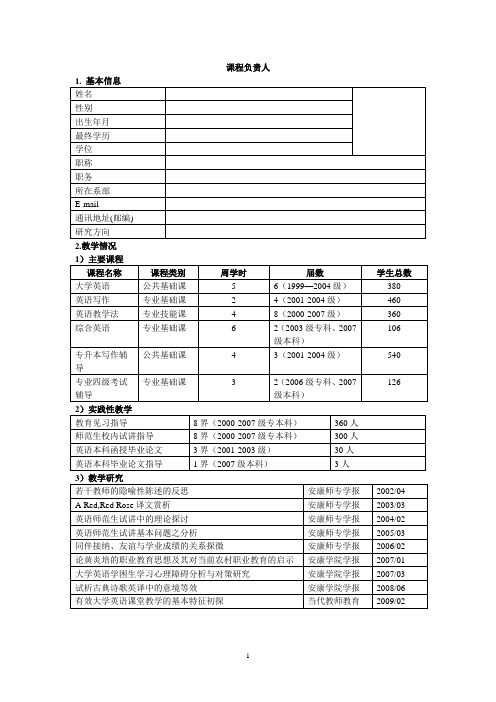
课程负责人2.教学情况5)获奖情况2004年、2005年分别评为系级、校级优秀教师。
主讲教师情况1. 基本信息2.教学情况1)主要课程2)实践性教学3)教学研究4)主持和参与的教研课题5)获奖情况教学队伍情况2教学队伍整体结构情况综合英语课程是英语专业本科的主干基础课。
目前从事本课程建设和教学的教师共7人。
其中副教授2人,讲师4人,助教1人。
具有硕士学位或正在攻读硕士学位的教师5人,拥有硕士学位以上学历的教师占57%。
主讲教师的年龄35岁以下4人,35岁以上,45岁以下2人。
本课程教师队伍结构基本合理,中青年结合,随着英语本科专业的持续发展,现任的大部分青年教师在老教师的指导下,必将在教学经验、教学水平、教学艺术上取得较大进步,成长为本课程的骨干教师。
高学历人才的引进,也必将为本课程师资力量的壮大增添新的血液。
在教培养方面,将采取以下措施:1. 搞好本课程青年教师的传、帮、带工作,要求青年教师分批考研,进行业务自修;2. 鼓励中年教师和已取得硕士学位的教师承担重要科研课题,参加重要学术会议;3.正确处理教学与科研的关系,鼓励青年教师撰写教研科研论文,提高学术研究水平。
3. 教学改革与教学研究《综合英语》课程是英语本科专业的主干基础课程,在我系开设时间较短。
为了提高教学质量,改革传统的英语精读教学方法和模式,为把该课程建设为系级乃至校级重点课程,我们已做了大量工作。
首先,认真学习《高校英语专业教学大纲》,制定了《综合英语》课程教学大纲,先后学习了任务型语言教学法、交际教学法、建构主义理论等,转变教学观念和思想,探讨教学方法,交流教学经验,解决教学中存在的问题和教学难点。
其次,为确保课程教学质量,确立了集体备课、下班辅导、单元测试等制度,通过严格完善教学管理促进教学水平的提高。
第三,规范教案格式,并每学期进行教案展示。
第四,定期开展主题鲜明的教研活动,要求每位教师撰写教学心得或教改总结。
第五,每学期举行公开课、观摩课活动,为教师提供展示才华、交流经验的平台。
现代大学英语精读1-4册大纲及教案
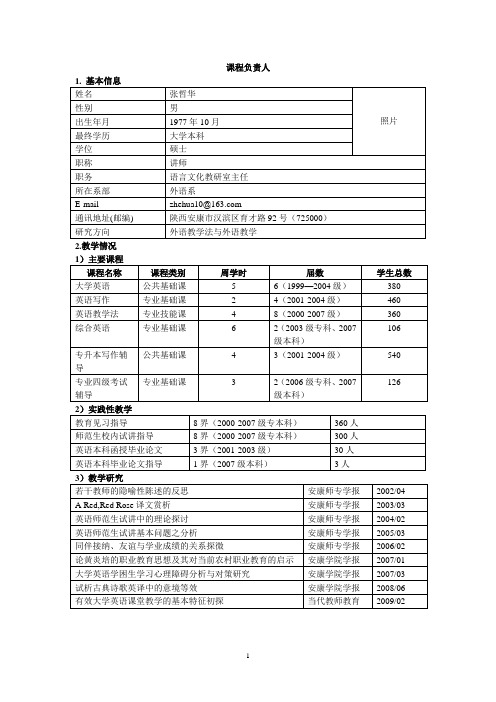
课程负责人2.教学情况5)获奖情况2004年、2005年分别评为系级、校级优秀教师。
主讲教师情况1. 基本信息2.教学情况1)主要课程2)实践性教学3)教学研究4)主持和参与的教研课题5)获奖情况教学队伍情况2教学队伍整体结构情况综合英语课程是英语专业本科的主干基础课。
目前从事本课程建设和教学的教师共7人。
其中副教授2人,讲师4人,助教1人。
具有硕士学位或正在攻读硕士学位的教师5人,拥有硕士学位以上学历的教师占57%。
主讲教师的年龄35岁以下4人,35岁以上,45岁以下2人。
本课程教师队伍结构基本合理,中青年结合,随着英语本科专业的持续发展,现任的大部分青年教师在老教师的指导下,必将在教学经验、教学水平、教学艺术上取得较大进步,成长为本课程的骨干教师。
高学历人才的引进,也必将为本课程师资力量的壮大增添新的血液。
在教培养方面,将采取以下措施:1. 搞好本课程青年教师的传、帮、带工作,要求青年教师分批考研,进行业务自修;2. 鼓励中年教师和已取得硕士学位的教师承担重要科研课题,参加重要学术会议;3.正确处理教学与科研的关系,鼓励青年教师撰写教研科研论文,提高学术研究水平。
3. 教学改革与教学研究《综合英语》课程是英语本科专业的主干基础课程,在我系开设时间较短。
为了提高教学质量,改革传统的英语精读教学方法和模式,为把该课程建设为系级乃至校级重点课程,我们已做了大量工作。
首先,认真学习《高校英语专业教学大纲》,制定了《综合英语》课程教学大纲,先后学习了任务型语言教学法、交际教学法、建构主义理论等,转变教学观念和思想,探讨教学方法,交流教学经验,解决教学中存在的问题和教学难点。
其次,为确保课程教学质量,确立了集体备课、下班辅导、单元测试等制度,通过严格完善教学管理促进教学水平的提高。
第三,规范教案格式,并每学期进行教案展示。
第四,定期开展主题鲜明的教研活动,要求每位教师撰写教学心得或教改总结。
第五,每学期举行公开课、观摩课活动,为教师提供展示才华、交流经验的平台。
现代大学英语精读1+Lesson+1+Half+a+Day
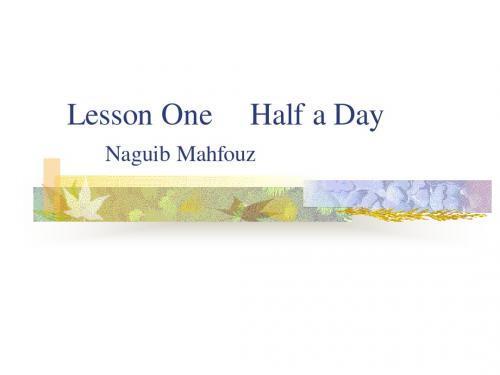
His Works
The Cairo Trilogy: Palace Walk, Palace of Desire, Sugar Street (first published 1957)
The Time and Place and Other Stories, 1991
His Influence
“As” introduces an adverbial clause of reason.
Noun phrase usu. followed by a relative clause is used as an adverbial of time.
Be to do sth: future tense indicating intention or plan
5. What’s your dream you want to realize during the four academic years? 6. What do you think of the relationship between the teachers and the students? 7. What are your expectations of university? What kind of changes do you think it will bring upon your life?
Language andபைடு நூலகம்Details
Words Phrases Sentence Pattern Grammar
clutch convince
throw into make out of tear from cling to
The day + that clause There is no/any good in doing
现在大学英语精读第二版1(unit1-unit6)教案

现在⼤学英语精读第⼆版1(unit1-unit6)教案Lesson One Half a DayI. Teaching ObjectivesIn this unit, you willa)learn some information about the author and the textb)catch the plot, setting and the theme after reading the story quicklyc)analyze the main characters of the textd)know the intention of the author to write the storye)paraphrase some difficult sentences from the storyf)pick out the good use of languageII. Main Contents1. Warm-up activities2. About the writer and the text3. Plot, setting and theme of the story4. Text appreciation5. Detail information of the text6. Reading of the text B7. Elliptical question & rhetorical question and Inverted sentences8. Finish off all the exercisesIII. Main Focus and PointsOral practice, analysis of the characters, language focus on actionsIV. Teaching Methodsa) Student-centered and task-based teaching methodsb) Reflective study and autonomous learningV. ReferenceWebsites about the writer and the storyTeacher’s bookVI. Exercises and PracticeFinish the exercises in the textbookRecite some parts of the text.VII. Further thinking"Who, through works rich in nuance - now clear-sightedly realistic, now evocatively ambiguous - has formed an Arabian narrative art that applies to all mankind”After reading “Half a Day”, how do you understand the comment on Naguib Mahfouz?Great works never fail to reveal the common human experience.After reading the story, do you feel emotionally or spiritually touched? Why or why not?IX. Teaching ProcedurePicture Talking for Warming-upToday, we will study Half a day by Naguib Mahfouz. Let’s first appreciate The Persistence of Memory, 1931by Salvador Dali (萨尔⽡多-达利的油画《记忆的永恒》). Can you find any clue about life and time from the picture? Do you know any sayings or quotes wise enough to express your feelings? I will write down a couple on the blackboard as hints.Let’s categorize the sayings and quotes according to the i mplications they carry. Hopefully, some expressions may help you better understand the story Half a Day, and meanwhile, you will find it excellent to have lots to express yourself in both writing and speaking.More quotes and sayings of time and life:If you want to make good use of your time, you've got to know what's most important and then give it all you've got.--Lee IacoccaNothing is worth more than this day.--Johann Wolfgang von GoetheEvery second is of infinite value.--Johann Wolfgang von GoetheHalf our life is spent trying to find something to do with the time we have rushed through life trying to save.--Will RogersDon't say you don't have enough time. You have exactly the same number of hours per day that were given to Helen Keller, Pasteur, Michaelangelo, Mother Teresea, Leonardo da Vinci, Thomas Jefferson, and Albert Einstein.--H. Jackson Brown, Jr.Time is what we want most, but what we use worst.--William Penn课前⼝头描述图画练习由⼝头描述相关图画⼊⼿,以了解学⽣预习课⽂内容的深度,提⾼学⽣描述场景的⼝语表达能⼒,帮助学⽣把扩充词汇量和在具体情景中使⽤词汇有机结合起来。
现代大学英语第一册 Leeson 1 教案
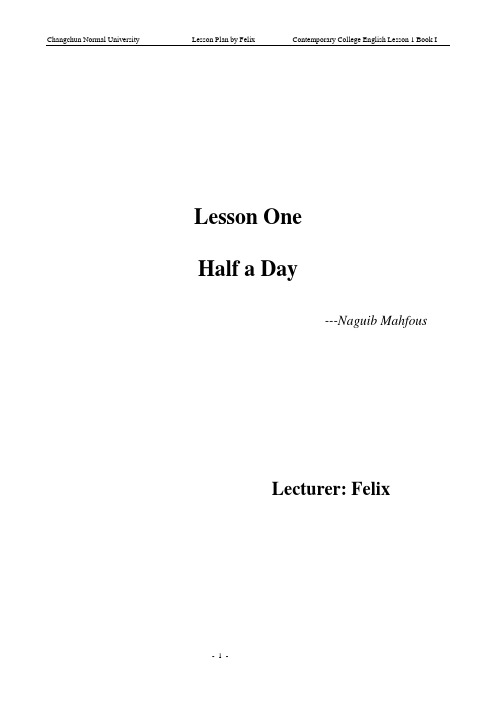
Lesson OneHalf a Day---Naguib MahfousLecturer: FelixLesson One: Half a day---by Naguib MahfousProcedure:Preview before classStage I: Check on Preview (50 m)Stage II: Warm-up Activities (20 m)Stage III: Background (5 m)Stage IV: Detailed Discussion (200 m)Stage V: retelling and summary (25 m)Stage VI: Exercises (100 m)Preview of Unit 1Part One: Text reading (10 pt)Reading the text as loudly, accurately, fluently as possible; following the speakers in the tapePart Two: V ocabulary and Phrases (10 pt)Looking up the dictionary and find a proper English definition of the new wordsTrying to get the main idea of the text and figure out the outline of the textPart Four: Preparatory work of oral work (10 pt)Getting ready for the prepared questions in the oral workPart Five: Research Work (10 pt)Doing some research on the related information of the text, and getting ready to share the information with your group in classA style in writing: allegoryA Prepared Topic for Discussion After ClassWe are just like a flash in the universe if we are considered from the history point of view. So what do you think is the most important thing in your life since it is so short like a flash?Stage I: Check on Preview (50 m)In this session, students are expected to prepare the lesson before class and collect some materials printed or written. Students are checked at random (using the cards), and they are graded.To check on reading, ask 5 or 6 students to read the text loudly and clearly (using the cards). Marks are given based on their accuracy, fluency and intonation.To check on vocabulary, ask 5 or 6 students to give the new words from this unit simple English definition (using the cards). Marks are given based on their exactness.To check on General understanding, ask 5 or 6 students to figure out the main idea, the theme and the outline of the text (using the cards). Marks are given based on their degree of understanding of the text.Main Idea:The narrator begins the day as a young boy entering school for the first time, but leaves the schoolyard an old man whose life has passed in what seemed like only ''half a dayThemes --Life/The Human Condition''Half a Day'' can only be fully understood if interpreted as an allegorical tale, in which each element is symbolic of some greater meaning. The central allegorical motif of "Half a Day'' is that a morning spent in school is symbolic of an entire lifetime spent in the school of life.Everything that occurs in the story represents common experiences of the human condition: birth, childhood, old age, death, the afterlife, religion, love, friendship, pain, fear, joy, learning, memory, and nostalgia, as well as the cycle of life from generation to generation....Outline:The text can be conveniently divided into three parts.In the first part (para.1—7),we learn about the boy’s misgivings about school. He found it hard to be away from home and mom,and thought school was a punishment.The second part (para.8一16)describes how the boy felt about school. He found that lire at school was rich and colorful in many ways, although it also required discipline and hard work.In the last part of the text,the boy walked out of the school to find that the outside world had changed beyond measure and that he had grown into an old man.To check on oral work, ask 5 or 6 students to answer some of the questions in the part “oral work” in this unit (using the cards). Marks are given based on their accuracy, fluency and intonation.To check on information searching, ask 5 or 6 students to share his/her findings with the class (using the cards). Marks are given based on value of the information and their expression of themselves.Stage II: Warm-up Activities (20 m)Task One: Brainstorm✓Suppose one day you went to a mountain and drank sth an old man offered, then you fell asleep. When you woke up you found yourself an old man and great changes had occurred in your town during your absence. ----Imagine the rapid changes in society.Task Two: Brainstorm words that are related to the common experience of the human condition (the experiences, emotions, needs etc that all people share, especially considered as a situation from which it is impossible to escape)---birth, childhood, old age, death, the afterlife, religion, love, friendship, pain, fear, joy, learning, memory, and nostalgia(思家病, 乡愁, 向往过去, 怀旧之情;)Task Three: Discuss the following questions in a group✓What did you feel on the first day to school?✓What happened on the first day to school?Stage III: Background (5 m)Author BiographyIn 1911 Mahfouz was born in Cairo, Egypt, the youngest of seven children in a lower middle-class family. His father was a strict Muslim and he was raised in a strong religious atmosphere. He earned an undergraduate degree in philosophy from the University of Fuad (now Cairo University) in 1934.Although his first short story was published in 1932, Mahfouz did not decide to become a writer until two years after graduating from college. He also maintained a career as an Egyptian bureaucrat. His first position was in the Ministry of Waqfs, the body overseeing pious Muslim foundations.16 of his novels have been adapted for films and his prose works have been compared in spirit and tone to the social realism of Balzac and Dickens. His most famous work The Cairo Trilogy(1957) is a sequence of novels that describes theHistorical ContextEgypt in the Twentieth CenturyMahfouz has been a witness to all of the major events in Egyptian history during his lifetime. Many of these events have had a profound effect on the subject matter, style, and political implications of his stories and novels.In 1922 Egypt gained independence from British rule. With the establishment of Israel as a sovereign nation in 1948, Egypt, and much of the Arab world, became engaged in a series of conflicts with Israel. As soon as the Israeli state had been formed, the surrounding Arab nations of Egypt, Syria, Iraq and Jordan attacked the...Stage IV: Detailed Discussion (200 m)Part OneSection A: Vocabulary/phrases1.alongsidenext to the side of somethingA car drew up alongside .Children's prices are shown alongside adult prices.2.clutchingto hold something tightly because you do not want to lose itHe clutched the rope we threw to himbe clutching at straws:[especially British English]to be trying everything possible to find a solution or hope in a difficult situation, even though it will probably be unsuccessfulI knew that trying the alternative medicine was just clutching at straws3.progressslow or steady movement somewhereWe made good progress despite the snow.in progress:[formal] happening now, and not yet finishedA lecture was in progress in the main hall.4.from time to timesometimes, but not regularly or very oftenHe goes to see his grandparents from time to time,about five or six times a year.5.be lined withto form rows along the sides of somethingThe street was lined with small shops.a tree-lined avenue6.palmalso palm tree:a tropical tree which grows near beaches or in deserts, with a long straight trunk and large pointed leaves at the top棕榈树date palm椰枣树PART OF HAND◀the inside surface of your hand, in which you hold things7.make sb/sth out of sb./sth.to make sb/sth.become...The coach made first class runners out of these ordinary girls.8.convinceto make someone feel certain that something is trueHer arguments didn't convince everyone, but changes were made.Baker had to convince jurors that his client had been nowhere near the scene of the murder.The officials were eager to convince us of the safety of the nuclear reactors.9.[phrase] it is no good/use doing sth.or there is no good to be had in doing sth:It is not useful to do sth.It’s no good crying over spilt milk.10.tear sb away fromtear somebody away phrasal verb: to make yourself or someone else leave a place when you or they do not want to leaveHe was enjoying the fun and couldn't tear himself awayThe child was tom away from its mother’s arms. 孩子被人从母亲的怀里夺走了。
现代大学英语精读教案完整版

现代大学英语精读教案集团标准化办公室:[VV986T-J682P28-JP266L8-68PNN]U n i t1H a l f a d a y教学目的 1. 了解作者及其背景知识;2.熟悉本文使用的写作手法;3.掌握修辞疑问句、倒装句等修辞手法;4.熟练掌握三类构词法;5.通过深刻理解文章内涵,培养学生社会洞察力和相关的讨论能力,同时掌握文中的核心语言点。
教学内容1. 热身2.作者教育与背景主要着作创作观3.作品赏析结构分析如何赏析文学作品扩展式讨论4.写作技巧省略疑问句和修辞疑问句倒装句“with”独立结构5.语言理解长难句解析核心词汇学习band, convince, daze, exert, intricate, observe, overlook, rank, revolve, startle, uviverse, vary介词练习构词法:-tion; -volve; -ly6.课堂讨论7.练与讲教学重点 1. 文学作品的赏析;2.文学中的修辞手法――省略疑问句和修辞疑问句;倒装句;“with”独立结构3.构词法:前缀教学方法结合实际吸收各种教学法(讲授、问答、讨论、模仿、练习、多媒体使用)的优点。
教学手段用投影仪播放PowerPoint课件及板书;群发电子邮件布置课堂资料和课后作业(或其来源)。
ⅠAbout the author★ Naguib Mahfouz was born on the 11th Dec. 1911 in an old quarter of Cairo, the youngest son of a merchant. (mummies and pyramids / sphinx 狮身人面)★ He worked in university administration(行政部门) and then in 1939 he worked for the Ministry of Islamic Affairs.( Buddhism Christianity Islam)★ He was later Head of the State Cinema Organization at the Ministry of Culture(文化部). He also worked as a journalist(记者).★ He is married, has two daughters and lives in Cairo.★ He was the first Arab to win the Nobel prize for literatureHe is now the author of no fewer than 30 novels, more than 100 short stories, and more than 200 articles. Half of his novels have been made into films which have circulated (流通;传播)throughout the Arabic-speaking world.The Cairo Trilogy(三部曲) is a tale of the lives of a Muslim family and spans(跨过) the first half of the 20th century.Palace Walk 《宫间街》Palace of Desire 《思官街》Sugar Street 《甘露街》How does he picture the world?1 The world is very gloomy(阴沉的令人沮丧的) though not completely disappointing.2 The author’s social utopia (乌托邦)is far from being realized.3 Time is the bringer of change and change is a very painful process.4 Life is a tragedy.ⅡText Appreciation1 structure2 Further discussionCan you recall your first day’s experience at primary school?Did you feel you were a stranger the first day you arrived at this university?Was it hard for you to leave home for the first time in your life What do you think is the business of university What do you expect to learn here3 Theme of the storyThe following are a few possible understandings of the message the story conveys. Which one do you agree with Argue with your group partners.Time and tide wait for no man.Life is a tragedy. There is nothing permanent in life but change.Education can never keep up with changes in society.Life is short and time is precious.Life is a dream. Do not take anything seriously.4 Structure of the textPart 1 (para. 1- 7 ) about:The boy’s misgivings about schoolPart 2 (para. 8-16 ) about: How the boy felt about school.Part 3 (para. 17-20 ) about: Walking out of the school, he found time had changed everything.5 Vocabularyband Word Formation bandage (n.)brand(adj.)Band of Brothersconvince Word Formation:convinced (adj.) convincing (adj.) convince sb of sth/thatI could not ~ him of his mistake.I am convinced of his honesty.一个令人信服的论点daze Word Formation dazzle (v.) dazzling (adj.)feel dazed (adj).习惯用语 in a daze (n) 茫然, 恍惚; 眼花缭乱dazzling sunshineexert Word Formation exertion (n.)exert on/upon 发挥;运用exert pressure on sbexert all one’s strength/influence to do sthexert oneself: make an effortexert oneself to arrive earlyintricate complex complicated sophisticatedobserve Word Formation observant (adj.) observatory (n.)overlook Word Formation over- : (prefix.)above; too;–overall overbusy overcome– overconfident overdraft6 Language Points1. I walked alongside my father, clutching his right hand. (para.1)alongside: side by side; next toclutching: present participle as adverbial modifierlist other examples from the text:2. They did not make me happy, however, as this was the day I was to be thrown into school for the first time. (para.1)What does “they” refer to?What does “to be thrown into” imply?3. My mother stood at the window watching our progress, and I turned towards her from time to time, hoping she would help. (para.2) Progress: slow and difficult movements toward schoolwhat do you know about the author’s relationship with hisparents?4. a street lined with gardens …(para.2)past participle phrase used here to modify “a street”.eg.a novel (that was) written by Charles Dickenspersonal computers (that are) made in China5. “Why school” I asked my father. “What have I done” (para. 3)elliptical questionrhetorical question“Why do I have to go to schoolI don’t think I’ve done anything wrong to be punished like this.”Eg:Rachel: Want a wedding dressMonica: What for?6.para.4 make… out of苹果汁是用苹果榨出来的。
现代大学英语第一册Lesson-1-Half-A-Day课件(ppt文档)

A Poem
First Day at School
It’s hard to explain, the way I feel; A place unknown but is so real! A soft voice welcomes me to the place, I look up to see a lady’s smiling face.
thorough, systematic, sustained, all-around training listening, reading, speaking, writing, translating skills
Intensive reading training develops through different stages, each stage with its own emphasis
To help students both clarify and consolidate grammar knowledge, particularly in terms of use
To help students further develop basic reading skills
Intensive reading is not evaluated by the course alone; its assessment has to be done in relation to the overall development of all the basic skills in all the courses
I feel like I’m on a roller coaster, which never seems to end.
现代大学英语精读第一册第一课课件Lesson1HalfaDay(可编辑)
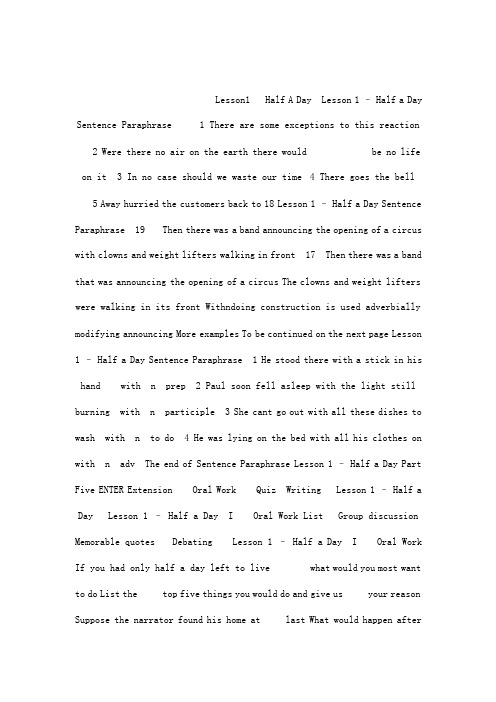
Lesson1 Half A Day Lesson 1 –Half a Day Sentence Paraphrase 1 There are some exceptions to this reaction2 Were there no air on the earth there would be no life on it3 In no case should we waste our time4 There goes the bell5 Away hurried the customers back to 18 Lesson 1 –Half a Day Sentence Paraphrase 19 Then there was a band announcing the opening of a circus with clowns and weight lifters walking in front 17 Then there was a band that was announcing the opening of a circus The clowns and weight lifters were walking in its front Withndoing construction is used adverbially modifying announcing More examples To be continued on the next page Lesson1 –Half a Day Sentence Paraphrase 1 He stood there with a stick in his hand with n prep2 Paul soon fell asleep with the light still burning with n participle3 She cant go out with all these dishes to wash with n to do4 He was lying on the bed with all his clothes on with n adv The end of Sentence Paraphrase Lesson 1 –Half a Day Part Five ENTER Extension Oral Work Quiz Writing Lesson 1 –Half a Day Lesson 1 – Half a Day I Oral Work List Group discussion Memorable quotes Debating Lesson 1 – Half a Day I Oral Work If you had only half a day left to live what would you most want to do List the top five things you would do and give us your reason Suppose the narrator found his home at last What would happen afterthat Work in groups Make up your own story of Half a Day and perform it Tell your funny stories about your first day at schoolBrainstorm in groups The end of Group discussion Lesson 1 –Half a DayI Oral Work Education has for its object the formation ofcharacter SpencerHerbert Education is a progressive discovery of our own ignorance W Durant Education makes a people easy to lead but difficult todrive easy to govern but impossible to slave H P Brougham How do you understand the following quotes Translation Tobe continued on the next page Lesson 1 – Half a Day I Oral Work教育以造就人的品质为其目标斯宾塞英格兰哲学家教育是一个逐步发现自己无知的过程杜兰特美国历史学家散文家教育使一个国家的人民容易领导但是难于驱使容易治理却不可奴役布罗厄姆英国政治家 The end of Memorable quotes Lesson 1 – Half a Day Howdid the boy feel the first day he went to school What happened the firstday at school How did the boy like school life Was school life just a matterof playing and fooling around What did he see on his way home Text AnalysisFurther discussion on the text The end of Further Discussion Lesson 1– Half a Day Writing Devices Now observe the following paragraphcarefully What strikes you most I did not know what to say The gatewas now closed Some of the children burst into tears The bell rang A ladycame along followed by a group of men The men began sorting us into ranksWe were formed into an intricate pattern in the great courtyard surroundedby high buildings from each floor we were overlooked by a long balconyroofed in wood Para 11 The great use of short and simple sentencesTo be continued on the next page Lesson 1 – Half a Day Writing DevicesMore examples I walked a few steps then came to a startled halt Good LordWhere was the street lined with gardens Where had it disappeared to Whendid all these cars invade it And when did all these people come to reston its surface How did these hills of rubbish find their way to cover itssides And where were the fields that bordered it High buildings had takenover the street was full of children and disturbing noises shook the airPara 17 Good God I was in a daze My head spun I almost went crazy Para18 Why did the author prefer to use short and s。
- 1、下载文档前请自行甄别文档内容的完整性,平台不提供额外的编辑、内容补充、找答案等附加服务。
- 2、"仅部分预览"的文档,不可在线预览部分如存在完整性等问题,可反馈申请退款(可完整预览的文档不适用该条件!)。
- 3、如文档侵犯您的权益,请联系客服反馈,我们会尽快为您处理(人工客服工作时间:9:00-18:30)。
Students study a wide range of subjectsin arts, sciences and technical areas.
College or University
Further/Higher education for 18+
Infant School
JuniorSchool
Primary education for 5/6—12/13
Children learn some basic skills in reading, writing, arithmetic, art, etc.
ComprehensiveSchoolor Grammar School
二、主要内容:
第教学周/第节(第次课)第页
教学目的
Teaching Objectives:
1) to have the class handle the usage of simple past and past perfect.
2) to have the class learn the key words and expressions
教学方法和手段
Teaching techniques
To integrate several different teaching methods and techniques: elicitation;explanation; illustration; recitationand discussion.
教学基本内容
备注
Unit 1 Half a Day
1Culture tips
Schools
Stages of education
Aims
PlaySchool
Nursery School
Preschool education
For 2—5 year-old
Children mostly play, with some early learning.
3) to have the class discuss theirfirst college day.
教学重点和难点
Teaching Focus
1)The first college day.
2)The way of telling story
Possible Difficulties
Comprehension of the text.
Theme of the story
The following are a few possibleunderstandings of the message the story conveys. Which one do you agree with? Argue with your group partners.
In the last part of the text(17-20), the boy walked ou the outside world had changed beyond measure and that he had grown into anold man.
Symbolism is used in the story to play up the theme: Life is like a day of a child, bitter, rich, colorful and short, which is a process of growing up, exploring and acquiring.
3 Vocabulary
1alongsideprep.Beside, next to在……旁边,沿着……;和……相比
Students study for degrees/diplomas in specialized academic areas.
2Structure
The text can be conveniently divided into three parts.
In the first part (para.1-7), we learn about the boy’s misgivings about school. He found it hard to be away from home and mom, and thought school was punishment.
Life is a dream. Do not take anything seriously.
Time goes by quickly and many things can take place in your lifetime. Before you know it, a new society is born.
General Analysis
Plot: a little boy’s first time to go to school
Setting: on the way to school
at school
on the way home
Protagonists: “I” –the boy in the story
Time and tide wait for no man.
Life is a tragedy. There is nothing permanent in life but change.
Education cannever keep up with changes insociety.
Life is short and time is precious.
The second part (para.8-16) describes how the boy felt about school. Hefoundthat life at school was rich and colorful in many ways, although it alsorequired discipline and hard work.
